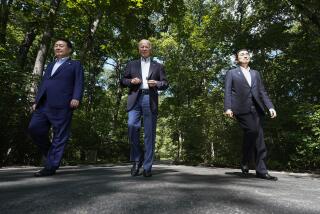Disarmament Agreements
- Share via
The forthcoming Mikhail Gorbachev-Ronald Reagan summit meeting in Moscow and the planned signing of an agreement on the reduction of strategic offensive weapons will certainly become a major stage in achieving universal security.
But in my opinion, a general fear of the possibility of a global cataclysm continues to dominate the social and psychological atmosphere around agreements on disarmament.
In this connection I would like to see a concerted plan for further arms control measures as the outcome of the upcoming summit meeting. This would inspire people with the hope that the disarmament process is strong and consistent.
A positive program of action with a view to transferring the means and resources from military to civilian production, to social projects is one of the ways to get rid of the fear of a nuclear catastrophe. Couldn’t our two countries undertake a joint study to work out the methods and means of such a conversion?
The hope for improving the social and psychological climate of international relations and eliminating the enemy image is connected in the Soviet Union with the policies of perestroika and glasnost , which are being conducted in our country. But this is a difficult process. All the more so as the United States sometimes measures the current Soviet economic and social changes and democratization only in terms of the American model of democracy and the American way of life. Hence the temptation to lecture us and even intervene in our domestic processes.
But the Soviet Union has chosen its own way of perfecting its society, which excludes the attempts to impose on us somebody else’s models. Though we are not against using the positive experience of other countries, the United States included, the establishment of the relations of trust among countries is a complicated and multifaceted process.
It calls for big steps toward disarmament and changes in the mentality of people.
This can only be attained through joint efforts, and above all, United States-Soviet Union efforts.
ARNOLD SHLEPAKOV
Professor
Academician of the Ukrainian Academy of Sciences
Director of the Institute
of Social and Economic
Problems of Foreign Countries
Kiev, USSR
More to Read
Sign up for Essential California
The most important California stories and recommendations in your inbox every morning.
You may occasionally receive promotional content from the Los Angeles Times.













